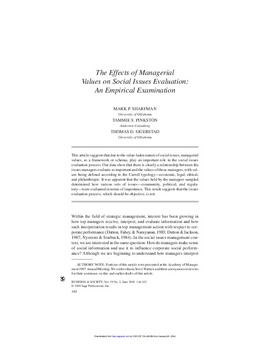| dc.contributor.author | Mark P. Sharfman | |
| dc.contributor.author | Tammie S. Pinkston | |
| dc.contributor.author | Thomas D. Sigerstad | |
| dc.date.accessioned | 2016-01-14T19:53:27Z | |
| dc.date.accessioned | 2016-03-30T15:34:43Z | |
| dc.date.available | 2016-01-14T19:53:27Z | |
| dc.date.available | 2016-03-30T15:34:43Z | |
| dc.date.issued | 2000-06-01 | |
| dc.identifier.citation | Sharfman, M. P., Pinkston, T. S., & Sigerstad, T. D. (2000). The Effects of Managerial Values on Social Issues Evaluation: An Empirical Examination. Business & Society, 39(2), 144-182. doi: 10.1177/000765030003900203 | en_US |
| dc.identifier.uri | https://hdl.handle.net/11244/25260 | |
| dc.description.abstract | This article suggests that due to the value-laden nature of social issues, managerial values, as a framework or schema, play an important role in the social issues evaluation process. Our data show that there is clearly a relationship between the issues managers evaluate as important and the values of those managers, with values being defined according to the Carroll typology—economic, legal, ethical, and philanthropic. It was apparent that the values held by the managers sampled determined how various sets of issues—community, political, and regulatory—were evaluated in terms of importance. This result suggests that the issues evaluation process, which should be objective, is not. | en_US |
| dc.language.iso | en_US | en_US |
| dc.publisher | Business & Society | |
| dc.title | The Effects of Managerial Values on Social Issues Evaluation: An Empirical Examination | en_US |
| dc.type | Research Article | en_US |
| dc.description.peerreview | Yes | en_US |
| dc.description.peerreviewnotes | https://us.sagepub.com/en-us/nam/manuscript-submission-guidelines | en_US |
| dc.identifier.doi | 10.1177/000765030003900203 | en_US |
| dc.rights.requestable | false | en_US |
